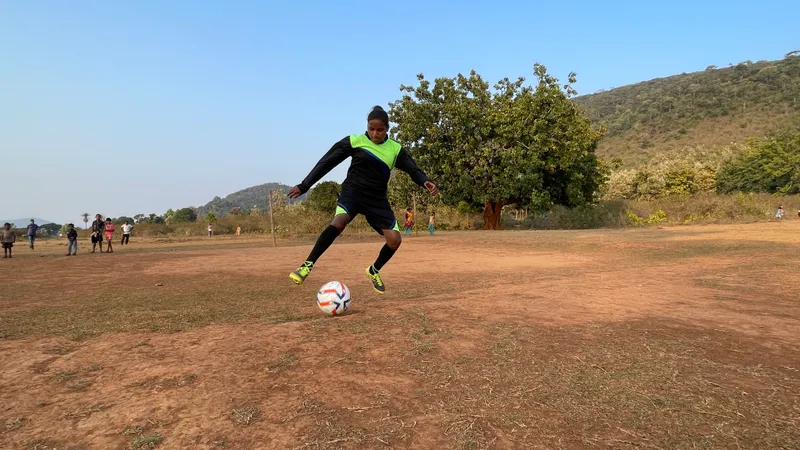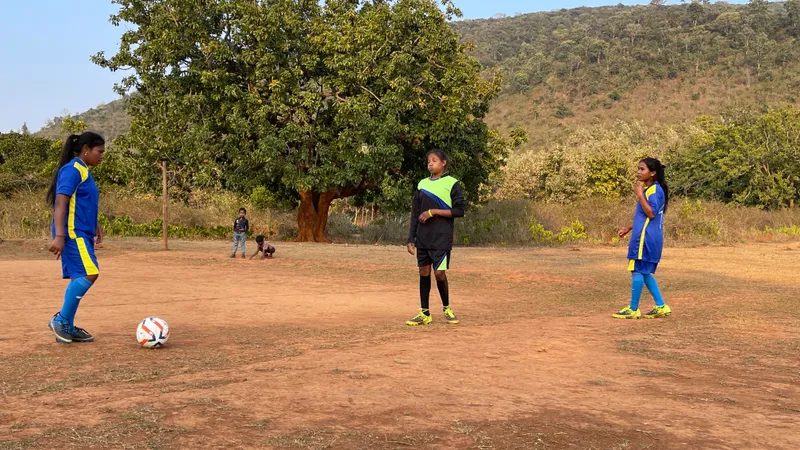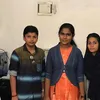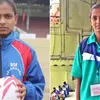How two sisters from a remote village in Odisha are changing destinies through football
Jyamuna and Sharmilata Pradhan have successfully helped stop child marriage while earning accolades for their village.
Every morning, Sharmilata Pradhan uses her family’s shared mode of transportation–a solitary cycle – to travel five kilometres, one way, to attend classes at a college in the town near her village.
The 19-year-old, who is studying economics and anthropology, is the first in her village to graduate high school. Her sibling, Jyamuna, 23, was forced to give up her education after Class 10 because the family could not afford to keep her in school while educating their other three children. Their parents are marginal farmers, who also work as labourers to help make ends meet, and Jyamuna has joined her parents to help support her siblings. Sharmilata too is pragmatic about what lies in store for her.

Sharmilata, 19, whose favourite player is Cristiano Ronaldo, dreams of playing football for India.
“Like Jyamuna, I will also have to give up studying after I graduate next year so that my brother and younger sister can continue their education. He will finish Class 10 soon and will need the cycle to attend college. He currently goes to a school far away from our village on the back of a friend’s cycle. My youngest sister studies at the school in our village,” says Sharmilata, speaking to Social Story from her village Jiridikia in Odisha’s Kandhamal district, one of the most remote areas in the state inhabited by tribals like the Kandha Primitive Tribal Group (PTG) to which the girls belong.
A new life goal
Amidst all their struggles, the girls have discovered an unlikely passion that they have used to transform the lives of other girls in the village–football. It all started when their parents decided it was time for Jyamuna to get married. She was only 15 years old at the time.
“Naturally, I resisted as I had no interest in getting married. Luckily for me, there was a workshop on Life Skill Training and Reproductive & Sexual Health conducted by Save the Children in our village, which I attended. I came back and lectured them on the harm that comes from child marriage. Of course, it took me three years to convince them, but they have never raised the subject with any of us since,” says Jyamuna. It was also during the workshop that they were first told about equality between boys and girls, a concept unheard of in their community. Jyamuna and Sharmilata were intrigued and delighted.

Jyamuna, 23, (far left) helps coach girls from their village and from neighbouring villages
“I used to watch the boys play football in the village ground and went and asked them if we could play with them. They shouted at us and were very abusive. But the girls wanted to play, so we cleared an area in the fallow field and played barefoot in our churidars. It was very hot, but we started playing and learned by just watching the boys,” says Jyamuna.
Seeing their interest, one of the men from the village, who plays football at the district level, agreed to coach them. The girls’ father also helped guide them whenever he found time. “We decided to ask Save the Children if they could help us get uniforms and they agreed. By this time, more girls from the village had joined, and we got uniforms for them too,” says Sharmilata.
“When the boys saw we had got uniforms, they started saying we were shameless for showing our legs and for wearing fitted clothes, but none of us bothered,” she says. Instead, they found a way to shut them up.
“We have won several inter-panchayat matches and placed second at inter-district matches. In March this year, we won the Sustainable Development Goals inter-district match. One of the girls from our village, Ambika Pradhan, has been selected to referee inter-district matches and is even a side referee at men’s matches. The boys can no longer say anything to us,” says Sharmilata, who is only disappointed that despite their achievements, there is no sports hostel for girls in Kandhamal like there is for boys. “We would love it if we could also get a sports hostel,” she says.
“We attended a 19-day camp in Kandhamal earlier this year, where we had appealed through the media for a hostel and better training facilities, but nothing has happened yet. There are over 20 girls in the village between the ages of 13 and 20 who currently play football and we would all benefit from the support,” she says.
Their success has inspired others, and 19 girls from two neighbouring villages frequently travel to Jiridikia for training.
Sparking a dream
The change that the sisters have sparked is being felt off the field as well. The girls have started a movement campaigning against child marriage and promoting the use of sanitary napkins and other safe menstrual practices.

Jiridikia village has not had a single child marriage since 2015 owing to the awareness raised by Jyamuna, Sharmilata, the girls in the village, and Save the Children
“We started organising small cultural shows and music programmes where we speak about the ills of child marriage. These shows have become very popular and people come from other villages to watch, and even pay money to see us. We contribute a part of it to the village and the rest goes back into getting football equipment,” says Jyamuna, who has also started coaching the girls.
“Do you know there has not been a single child marriage in our village for the past five years? The girls are out there making the village proud. Earlier, the boys would get all the attention. Today, people are proud of the girls of the village. Before this, we would not be allowed to go anywhere. Today, we travel all over the district to play football,” says Sharmilata cheerfully.
Jyamuna says her dream is for Sharmilata to get her chance to play at the state and national levels. At 23, she wonders if it is too late for her. “All the girls need is the opportunity and the training,” she says.
Speaking to Social Story, Manoj Kumar Mishra, Assistant Manager, Project Odisha State Programme Office, Save the Children, who has helped facilitate the conversation as a translator, when needed, says, “This is a village where even an Innova would not go because there were no roads. Till a few decades ago, there was no electricity here, and even human sacrifice was not unheard of. It’s no small feat for girls to do so much from a village like this.”
But, Sharmilata wants the last word. “My dream is to be the best player in the country. Just like our favourite player Ronaldo, who is the best in the world,” she says, also adding that she would like to join the police force one day.
For now, she just wants to play her favourite sport.
Edited by Megha Reddy









